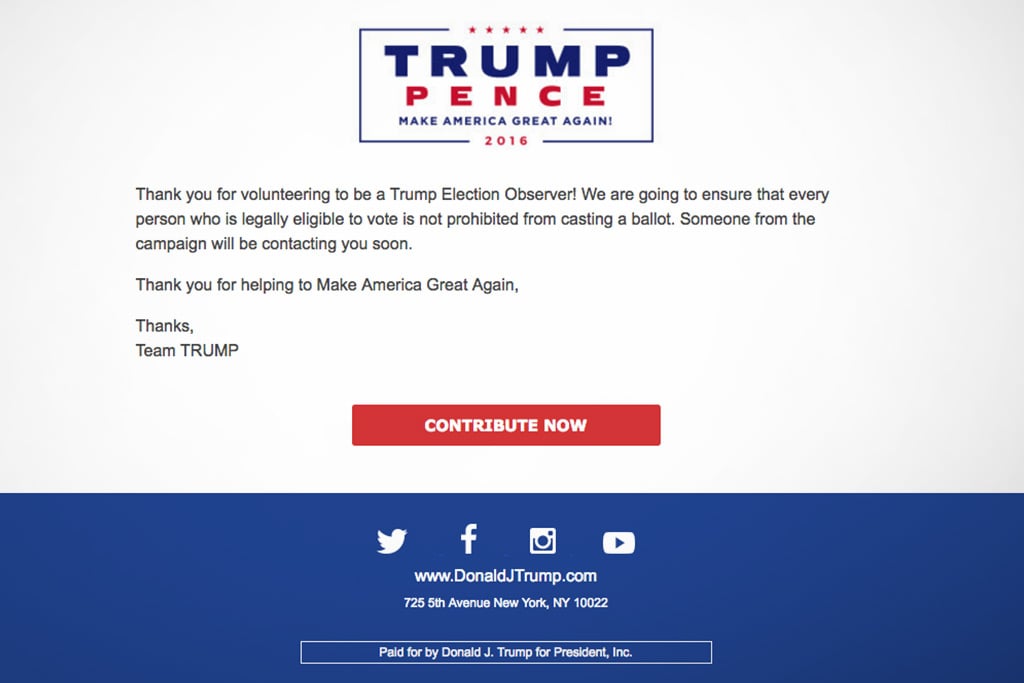Texas Leaders Mum on Trump's Plan to Enlist Election Observers
/https://static.texastribune.org/media/images/2016/07/21/Trump_Day_4_RNC_TT.jpg)
In 2012, Greg Abbott caused a stir when he issued this warning to international election observers: Don’t set foot inside Texas polling places.
Abbott, then the attorney general, was worried the Organization for Security and Co-operation in Europe — which routinely dispatches election monitors to the United States and other countries and had met with opponents of Texas’ voter ID law — could interfere with general election voting.
"Our concern is that this isn't some benign observation but something intended to be far more prying and maybe even an attempt to suppress voter integrity," he told Reuters at the time. He even threatened to "bring criminal charges if needed."
But four years and one presidential cycle later, Texas officials are so far silent about a possible fleet of partisan election observers Republican presidential nominee Donald Trump is urging to the polls.
“Help Me Stop Crooked Hillary From Rigging This Election!” pleads a volunteer sign-up form on the real estate mogul's website.
Trump’s campaign — which did not respond to requests for comment for this article — has not released details on its poll-watching strategy, or how it plans to ensure volunteers abide by state and federal laws. Texas law allows candidates and political parties to appoint a limited number of poll watchers as long as they follow a litany of rules. But a robust monitoring effort like the one Trump is calling for is rare in the United States.
“It’s something you’re more likely to find in the developing world,” said Mark Jones, a political science fellow at Rice University’s Baker Institute.
“You’re more likely to have people that disrupt the process than actually monitor,” he added.
Though Trump has called U.S. elections "rigged," proven cases of in-person voting fraud are incredibly rare in this country, several comprehensive studies show — perhaps because a perpetrator’s risk of getting caught far outweighs the benefit of adding one vote for a preferred candidate.
Absentee ballots, which Texas lawmakers have not sought to secure with ID requirements, are far more susceptible to fraud, experts say.
Abbott, now the governor, and Attorney General Ken Paxton have been speaking plenty over the past month about protecting the integrity of elections. That’s since a federal appeals court ruled in July that Texas’ strict voter ID law — which state lawmakers claimed would prevent voter fraud — discriminates against minority groups in violation of the federal Voting Rights Act.
But they have not addressed Trump’s poll-watching effort. Abbott’s office declined to comment for this story. A spokeswoman for Paxton said she was asking her boss if he’d like to comment; he did not respond Wednesday or Thursday.
Manny Garcia, deputy executive director of the Texas Democratic Party, said he was not surprised that Texas leaders were mum about Trump’s plans — and not only because they are party mates.
“They have not shown any regard for making sure that state government is a partner in increasing civic engagement in the state of Texas,” he said.
Rules for poll-watchers
Though large-scale poll watching efforts are not particularly common, they are not unprecedented in Texas.
In 2010, Harris County officials requested an election monitor from the U.S. Department of Justice after Democrats alleged that some 300 Tea Party activists were “hovering” over voters. The county officials assembled representatives from both major parties to remind them of Texas’ poll-watching rules, according to a Houston Chronicle account at the time.

Under those rules, poll watchers must be qualified voters and follow a number of regulations in Texas. To observe, they must present a “certificate of appointment” to local election officials, which could come from the party, campaign or candidate appointing them, according to state law.
Watchers may enter a polling place, but Texas bars them from accessing a voting station when a voter is preparing a ballot. They may not communicate with voters or election officials unless they are reporting an irregularity to an election officer. They also may not record sound or images.
Finally, Texas law prohibits most anyone — poll watchers included — from wearing a badge, insignia or emblem related to a candidate, measure or party on the ballot within 100 feet of a polling place’s door.
As Trump rolls out his election-watching campaign this year, election experts wonder what his volunteers will be looking for — particularly since Texas voters, following the court ruling, may still vote without presenting photo ID.
“It’s especially salient given the controversy surrounding voter ID," Jones said.
Alicia Pierce, a spokeswoman for Texas Secretary of State Carlos Cascos, said her agency “is ready to advise any candidate or campaign about the requirements in Texas law regarding poll watchers.”
A change in Trump's tone?
Trump’s team may be listening to concerns about his poll-watcher drive. Days ago, those who had signed up on his website promptly received an email stating: "We are going to do everything we are legally allowed to do to stop crooked Hillary from rigging this election.” Comedian John Oliver highlighted the email on his show "Last Week Tonight."
When a Texas Tribune reporter filled out the same form on Trump’s website on Wednesday, the campaign’s reply did not contain that language.
“We are going to ensure that every person who is legally eligible to vote is not prohibited from casting a ballot,” the automated email said. “Someone from the campaign will be contacting you soon.”
Disclosure: Rice University has been a financial supporter of The Texas Tribune. A complete list of Tribune donors and sponsors can be viewed here.
Information about the authors
Learn about The Texas Tribune’s policies, including our partnership with The Trust Project to increase transparency in news.
/https://static.texastribune.org/media/profiles/Jim_1.jpg)